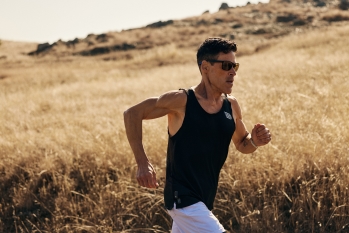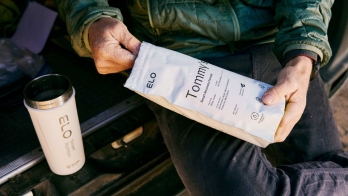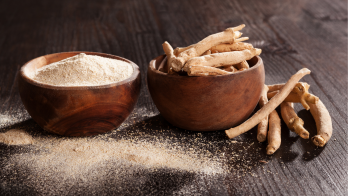The best pre- and post-workout strategies for cyclists
Nutrition plays an important role in cycling performance and recovery, and while each person has varying needs, there are some general research-backed recommendations for improving efficiency and performance on the bike. Here’s what science has to say about the best pre-and post-workout strategies for cycling performance.

Contents
What to look for in pre-and post-workout nutrition Carbohydrates Protein Caffeine Hydration Other ergogenic aids for pre- or post-workout nutrition Pre-workout snack and meal ideas Post-workout snack and meal ideas Other pre-and post-workout strategies to enhance performance and boost recovery in cyclists Summary Key takeawaysRegardless of your expertise level on the bike, nutrition can make or break your ride. Factors such as hydration status, carb/protein/fat intake, nutrient timing, and length of exercise all play a role in how you perform (and recover). Add different environments, distances and intensities into the mix, and it’s no wonder that fueling can be a challenge.
However, all is not lost–with careful consideration and optimal nutrition, you can mitigate negative side effects, boost performance, and improve recovery. Here's what science has to say about the best pre- and post-workout nutrition strategies for cyclists.
What to look for in pre-and post-workout nutrition
Nutrition is going to look different based on when you fuel. From dosing recommendations to dietary sources, here’s what you should look for in pre- and post-workout nutrition.

Carbohydrates
Carbohydrates are the most efficient macronutrient group for working muscles because they provide quick, usable energy and help load and replenish muscle glycogen stores.
Pre-workout nutrition.
Blood glucose and muscle glycogen (stored carbohydrates) are the most important substrates for contracting muscles in endurance activity [ 1 2 1 2
Eating carbohydrates pre-workout helps top off glycogen stores and provides readily-available fuel for working muscles when you get on the bike, so here are some general recommendations to consider before heading out.
1 to 4 hours before exercising:To increase muscle glycogen concentrations before exercise, aim to take in 1-4 g of carbohydrates/kg of body weight 1-4 hours before exercise [
4
]. This means that a 150 pound (68 kg) person would need between 68 - 272 g/carbohydrates before a ride. However, this range can differ based on each cyclist, so the amount you eat should depend on how you feel [12
,26
].In events lasting more than 90 minutes: Super-compensated muscle glycogen levels can be achieved through carbohydrate loading in the day(s) leading up to a race or intense workout lasting more than 90 minutes. Studies have found that athletes who did carb loading showed improved performance by 2-3% compared to those who didn’t [
2
].
Post-workout nutrition.
While experts debate about the “window of opportunity” for refueling after an endurance ride, research shows that the ratio of glycogen resynthesis is much higher if carbohydrate intake takes place within 2 hours of finishing exercise [ 4 5
For optimal glycogen replenishment, aim to consume 45-90 g/carbohydrates (or 1 g of carbohydrates/kg/h) within 2-4 hours after training, depending on your body weight and the intensity of your ride [ 4
Dosing recommendations.
In total, cyclists should aim to match daily carbohydrate intake to the energy requirements of their training, which can range between 5-12 g/kg of body weight/day [ 2 4
However, research indicates that excessive carbohydrate intake may adversely affect performance, so gut tolerance should be practiced and taken into consideration before, during, and after a ride [ 2 3 4
Sources of carbohydrates.
Carbohydrates are classified as either high-glycemic (rapidly digested and absorbed) or low glycemic (slowly digested and absorbed), and both can be helpful in a cyclist’s diet.
While high fiber, low glycemic carbohydrates offer more health benefits than refined, high glycemic carbohydrate choices, the latter may be beneficial closer to exercise–especially for those with sensitive stomachs. For instance, high glycemic carbohydrates (such as sports drinks, juice, and gels) can be useful immediately before, during, and after exercise to minimize GI distress, speed up recovery and provide quick energy [ 2 4 5
Carbohydrate-rich foods include:
Whole grains (rolled oats, rice, farro, barley, quinoa, sprouted grain bread, granola)
Starchy vegetables (sweet potato, potato, squash)
Fruit
Dried fruit
Nutrition bar with >25g carb and <5g fiber per serving
Higher glycemic refined grains (white bread, bagels, pasta, cereals, and juice)
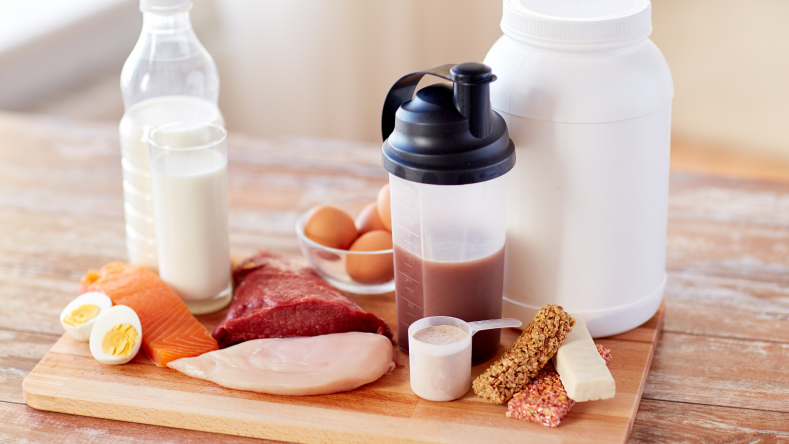
Protein
Protein is an essential macronutrient composed of 20 different amino acids, nine of which must be obtained from the diet because the body can’t produce them on its own. Amino acids are considered the primary building blocks of your body since they are found in muscles, tendons, bone, skin, hormones, tissue, enzymes, red blood cells, and more.
Dietary protein provides the amino acids your body needs to heal wounds and injuries, synthesize hormones and enzymes, and even store and carry oxygen throughout the body. It can also help with weight management, muscle growth, and recovery, all of which are important for cyclists.
Pre-workout nutrition.
The role of amino acids and/or protein consumption before exercise is inconclusive. While some studies have shown increased muscle protein synthesis rates, more research needs to be done to identify the potential impact and role of protein intake before endurance exercise [ 10
Post-workout nutrition.
The ingestion of protein after an exercise session is one of the core principles of nutrient timing for athletes. Protein plays a large role in post-workout nutrition, as it contains leucine, an amino acid that is responsible for muscle protein synthesis. Leucine helps to stimulate muscle growth and repair, while reducing the rate of muscle protein breakdown and enhancing overall recovery [ 10 12
To optimize muscle synthesis and promote recovery post-ride, studies have found that it’s best to consume 25-40 g/protein(0.4 to 0.5 g/kg or 0.9 to 1.1 g/lb) from high quality sources [ 2 5 27 9 12
Additionally, research shows that consuming 2-3 g of leucine post-workout–either in the form of protein powder (like whey or soy), or leucine-rich foods 10 12 13
Dosing recommendations.
Research shows that ingesting a 20-40 g dose of high-quality protein (0.25-.40 g/kg of body mass/dose) every 3-4 hours is associated with improved body composition and performance outcomes [ 10 10 11
Sources of protein.
Good protein sources include eggs, dairy, lean meat, poultry, fish, beans, lentils, soybeans, and tofu, as well as supplements (such as protein powder) and protein-fortified foods.
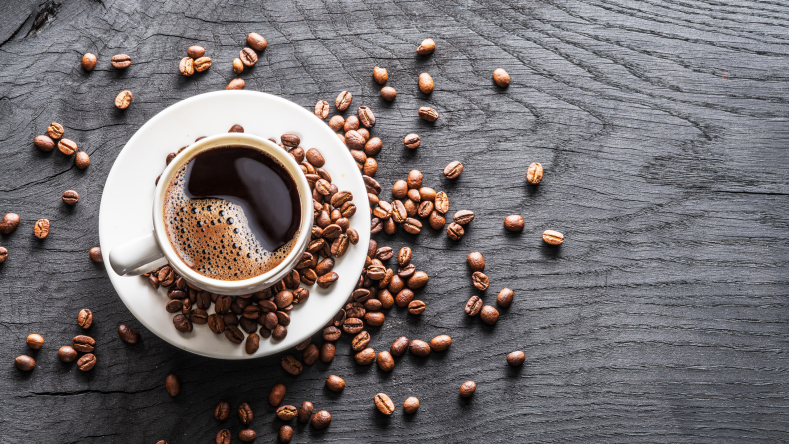
Caffeine
Caffeine is a common supplement used in endurance sports to reduce the perception of fatigue and allow exercise to be sustained at optimal intensity for longer times [ 2 14
Pre-workout nutrition.
Many studies have reported an enhancement of prolonged, submaximal exercise after caffeine ingestion, while some have even shown improved cognitive processing, especially among athletes experiencing sleep deprivation [ 2 14 17
For optimal performance results, it’s recommended to consume 3-6 mg caffeine/kg of body weight between 30-90 minutes before you get on the bike [ 2 14
Post-workout nutrition.
Recent studies indicate that lower doses of caffeine (1-2 mg/kg) taken later during endurance exercise may lead to increased performance [ 2 14 38 39
Dosing recommendations.
Generally speaking, you can consume between 400-500 mg of caffeine/day (roughly 4-5 cups of coffee) to enjoy performance-enhancing benefits without unpleasant side effects [ 2
However, high doses of caffeine can have adverse effects on the cardiovascular system–including heart palpitations, arrhythmias, and elevated blood pressure–and may cause anxiety, insomnia, restlessness, nausea, headaches, and diarrhea [ 13 14
Sources of caffeine.
You can consume caffeine from various foods, beverages, and supplements.
Coffee and tea are the most commonly consumed sources of caffeine. The caffeine content in beverages can vary significantly from cup to cup depending on the variety, roast, and brewing technique, but here’s the caffeine you can expect to get from an 8-ounce mug [ 37
Coffee: 95-200 mg
Green tea: 30-50 mg
Black tea: 25-110 mg
Caffeine can also be consumed through certain sports food and beverage products--including energy drinks, gels, chews, gum, powders and bars, as well as in supplement form.
Cyclists should be especially cautious with energy drinks and caffeine pills, as these supplement forms can contain higher concentrations of caffeine than coffee, which may lead to negative side effects if consumed in excess. Energy drinks also often contain other sources of caffeine, such as guarana, which may not be appropriately labeled [ 37
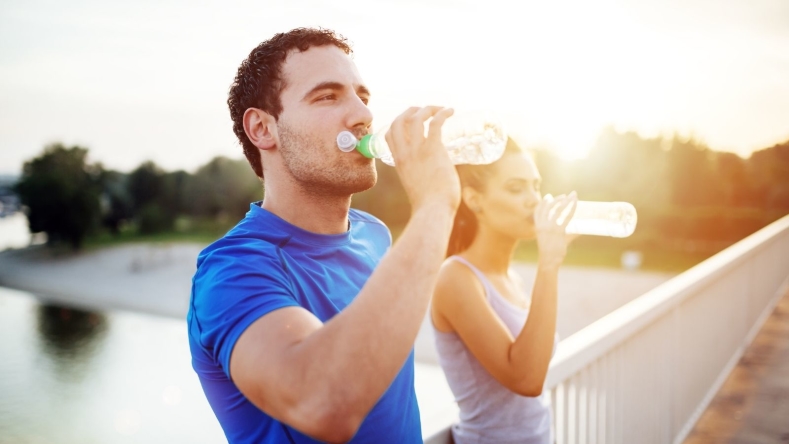
Hydration
A single exercise session can leave you parched, foggy, and nauseous if you don't top-off your fluids. Dehydration can compromise exercise performance, as well as lead to dangerous health consequences, so it’s important to make sure that you stay hydrated throughout your ride.
Not only does adequate fluid before, during, and after cycling help regulate body temperature, but it can reduce cardiovascular strain and improve post-ride recovery. While water is best, sports drinks can prove beneficial during and after longer endurance activities, since they contain a combination of water (for hydration), carbohydrates (for quick-burning fuel), and electrolytes (to offset those lost in sweat).
Pre-workout nutrition.
Hydration needs will look different for everyone, but a general recommendation is to consume 5-7 mL of fluid/kg body weight at least 4 hours before exercise, and another 3-5 mL/kg body weight about 2 hours before getting on the bike [ 2
Post-workout nutrition.
After exercise, the goal is to replenish fluids and electrolytes lost on the bike. There are a few ways to do this:
Step on the scale. One easy way to measure fluid losses during a long ride is to weigh yourself before and after a workout. Aim to take in roughly 16 oz. (2 cups) of fluid for every 1 lb. (0.5 kg) lost.
Monitor urine color. If there’s no scale nearby, you can always use urine color as an approximation of hydration status. Urine that is lemonade-colored or lighter generally means that you’re hydrated, whereas dark yellow urine is a sign of dehydration.
Dosing recommendations.
While maintaining adequate hydration in and around exercise is important, staying hydrated throughout the day also contributes to optimal recovery and performance.
It’s recommended to consume ½ oz. fluid per pound of bodyweight. For example, if you weigh 190lb (86 kg), you should drink 95 oz. (3 L) of water a day, plus additional fluid before, during, and after a workout [ 45
Hydration sources.
When it comes to hydration, water is best, but sports drinks are available in ready-to-drink bottles and can provide some electrolytes.
Dissolvable electrolyte tablets and powders may also be beneficial if you sweat heavily during exercise or are exercising in hot and humid conditions but do not need the additional carbohydrate from a traditional sports drink.
Other ergogenic aids for pre- or post-workout nutrition
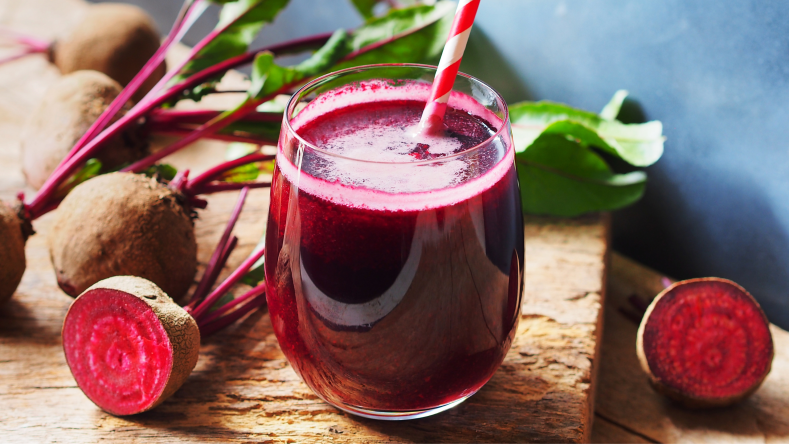
Nitrates
Nitrates are inorganic compounds that increase nitric oxide levels in the body and help blood vessels to expand and relax; as such, this improves the uptake of oxygen and blood flow, and may even boost performance among endurance athletes [ 22 42
The recommended dose of nitrates for endurance activity is 300-600 mg (or 0.1 mmol/kg of body weight) 2-3 hours before exercise [ 22 22 23
Tart cherry juice
Tart cherry juice is teeming with antioxidants and polyphenolic compounds, and may even help athletic performance.
Some evidence suggests that taking 8-12 oz. of tart cherry juice (or 1 oz. of concentrate) twice/day for 4-5 days before an event, or for 2-3 days after, may help promote recovery and reduce muscle soreness, although research is inconclusive [ 15 17 21
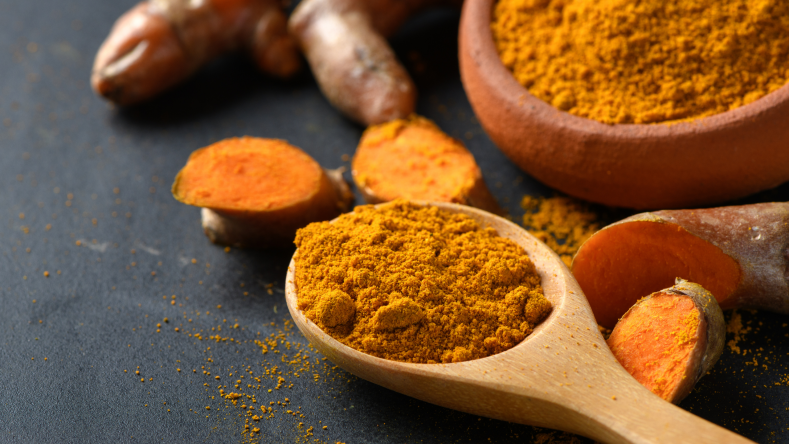
Turmeric
Curcumin, the main compound in turmeric, has an array of anti-inflammatory benefits that may be beneficial in the recovery period.
Studies indicate that 150-1,500 mg of turmeric/day may improve post-exercise recovery and reduce muscle soreness. One study found that ingestion before exercise could attenuate acute inflammation, and after exercise, it could reduce muscle damage and facilitate faster recovery [ 16 40 41
Additionally, studies show that combining turmeric with black pepper can enhance the absorption of curcumin by up to 2,000% and increase its effectiveness [ 16
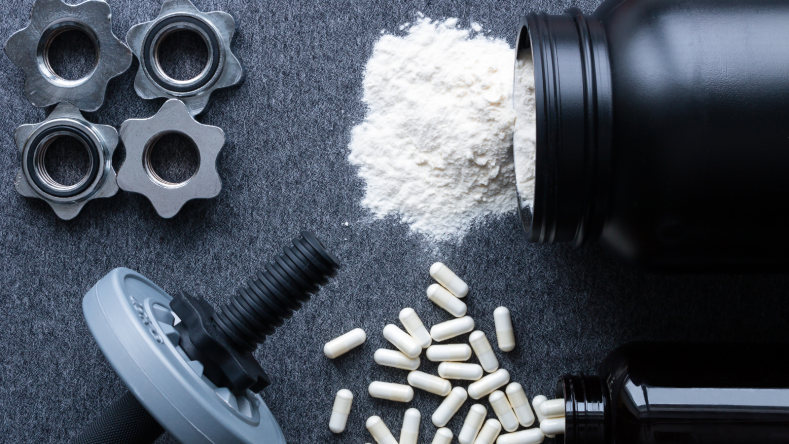
Creatine
Creatine 17 43
To start supplementation, look for creatine monohydrate and begin with a loading dose of 20 g/day for 5 days, followed by 3-5 g/day thereafter [ 17
Beta-alanine
Beta-alanine is a compound found in muscles that may help buffer lactic acid production. Some evidence shows that beta-alanine may help improve performance and reduce neuromuscular fatigue, although the impact on longer-lasting endurance activities (like cycling) is not yet well-understood [ 18 19 18
The optimal dosage of beta-alanine appears to be 4-6 g/day, split over 2 doses, for 2-4 weeks [ 18 19
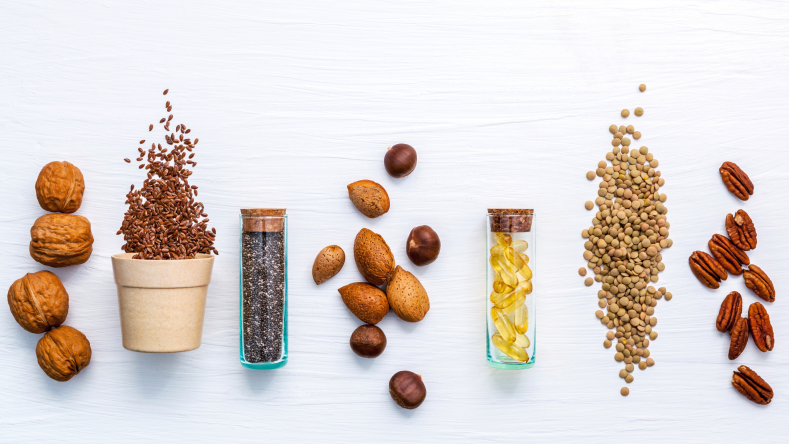
Omega-3 fatty acids
Emerging research indicates that omega-3 fatty acids 17
The common recommended dose for taking DHA and EPA omega-3 fatty acids is 2 g/day, with fatty fish (such as salmon, trout, tuna, and sardines) and fish oil being excellent sources [ 17 20
Vitamin C
Vitamin C is a natural antioxidant and water-soluble vitamin that may enhance immune function and your natural antioxidant defense [ 17 44
While supplementation may not definitively help performance, having suboptimal vitamin C levels could hurt performance, as deficiency can impair the immune system during heavy training, and result in reduced working capacity, a lower VO2 max, and weakened antioxidant systems [ 22 25
Hungry for more? Check out these other science-backed
nutrition recovery products
for cyclists.
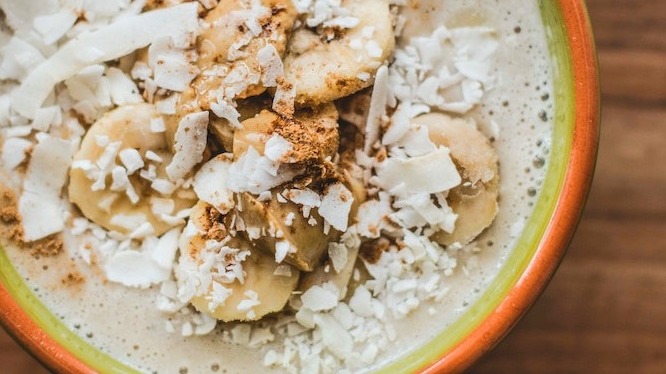
Pre-workout snack and meal ideas
When you eat can often play as large a role as what you eat before a ride. Here are some pre-workout snack and meal ideas that may help enhance performance on the bike.
2-4 hours before your ride.
Aim to eat your last full meal 2-4 hours before your ride. Your goal should be a balanced meal that includes carbohydrates, protein, and fat, with carbohydrates being the main focus. Some examples include:
Oatmeal with banana, berries, nut butter
Eggs with toast, fruit, and juice
Sandwich on whole-grain bread with turkey, avocado, lettuce, tomato
Rice bowl with choice of protein and veggies
15-30 minutes before your ride.
Higher glycemic carbohydrates that are easily digestible can be useful immediately before exercise to minimize GI distress and provide quick energy. Some examples include:
Banana
8 oz juice or sports drink
Energy gel
Half a piece of fruit or energy bar with low fiber
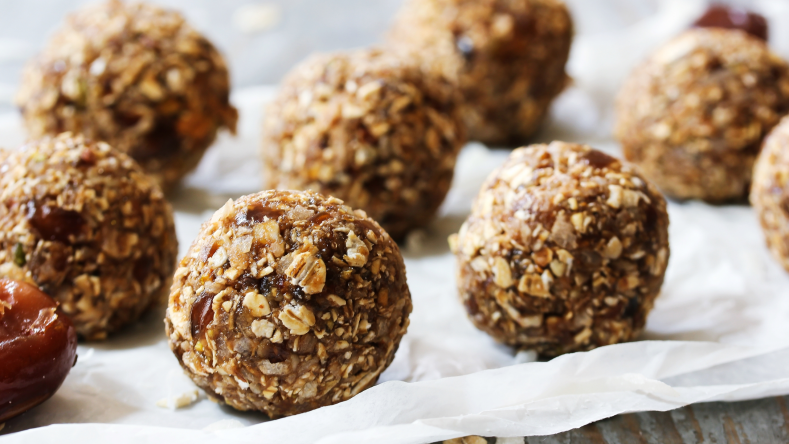
Post-workout snack and meal ideas
What and when you eat after your ride matters, too, so don’t forget about refueling. The optimal time for refueling is 15-60 minutes post-workout, with an emphasis on protein, carbohydrates and fluids [ 1 2
Here are some examples of post-workout snacks and meals that may help boost recovery.
Chocolate milk + a banana
Omelet with toast and fruit
Sandwich on whole-grain bread
Yogurt parfait with fruit, nuts and cereal or granola
Protein shake or smoothie
Other pre-and post-workout strategies to enhance performance and boost recovery in cyclists
Aside from nutrition, here are some other pre-and post-workout strategies that may play a role in performance and recovery.
Sauna treatments.
A small research study in runners found that 3 weeks of post-training sauna treatments for ~30 minutes can lead to physiological adaptations that may enhance endurance performance [ 46 46 47
Cold water immersion.
Cold water immersion may help reduce heart rate and core temperature after cycling. Studies have found this to be a safe and effective intervention for maintaining repeat cycling performance in the heat, especially in warmer conditions [ 7 28

Adequate sleep and rest.
The importance of sleep (and rest days) cannot be underemphasized when it comes to performance and recovery, as it is one of the main ways the body recovers. Poor sleep quality is associated with poor mood, impaired motor skills, decreased alertness, pre-training fatigue, impaired performance over long durations, and increased perceived exertion during exercise [ 34 35 36
Experts recommend sleeping 7 hours each night, but if you have trouble falling (or staying asleep), here are some
safe sleep supplements
that may help.
Training periodization.
Training periodization refers to sequencing the duration and/or intensity of workouts into specialized training cycles which contain highly concentrated workloads directed to a minimal number of targeted abilities [ 29 30 29
Sports psychology.
Sports psychology represents the use of mental skills training within the sport and exercise domain [ 31 32 33 32
Gut training.
Gastrointestinal complaints among long-distance endurance athletes are quite common, with studies reporting a prevalence of between 10% and 95%, depending on the event [ 8 2 6
Staying hydrated and modifying your pre-workout snack or meal can also help improve symptoms, as GI problems are more likely to occur if you are dehydrated.
Learn more about
what causes gut issues and how to prevent them
.
Summary
What you eat (and when) can play a significant role in your performance on the bike, as prioritizing optimal nutrition and hydration leads to steadier energy levels, lessened fatigue, improved endurance, reduced GI issues, and a quicker recovery. You can also improve cycling performance through other lifestyle strategies, including cold water immersion and getting enough sleep.
Disclaimer: The text, images, videos, and other media on this page are provided for informational purposes only and are not intended to treat, diagnose or replace personalized medical care.
Key takeaways
Consuming carbohydrates before and after workouts helps prioritize quick energy and optimize glycogen stores.
Protein plays a large role in post-workout nutrition, as it contains leucine, an amino acid that is responsible for muscle protein synthesis. Leucine helps to stimulate muscle growth and repair, while reducing the rate of muscle protein breakdown and enhancing overall recovery [
10
,12
].Dehydration can compromise exercise performance, as well as lead to dangerous health consequences, so it’s important to make sure that you stay well-hydrated before, during, and after your ride.
Caffeine can help reduce the perception of fatigue and help sustain exercise at optimal intensity for a longer period of time [
2
].Other recovery aids (such as tart cherry juice, omega 3 fatty acids, turmeric, vitamin C, creatine, and beta-alanine) may help reduce inflammation and improve recovery [
15
,16
,17
,18,
19
,21
].Sauna treatments, cold water immersion, adequate sleep, training periodization, sports psyhcology, and gut training are some other pre-and post-workout strategies that may play a role in performance and recovery.
References
Brooke, N. K., & Cosio-Lima, L. (2022). Nutrition in Cycling. Physical medicine and rehabilitation clinics of North America, 33(1), 159–172.
https://doi.org/10.1016/j.pmr.2021.08.011
Jeukendrup A. E. (2011). Nutrition for endurance sports: marathon, triathlon, and road cycling. Journal of sports sciences, 29 Suppl 1, S91–S99.
https://doi.org/10.1080/02640414.2011.610348
American College of Sports Medicine, Sawka, M. N., Burke, L. M., Eichner, E. R., Maughan, R. J., Montain, S. J., & Stachenfeld, N. S. (2007). American College of Sports Medicine position stand. Exercise and fluid replacement. Medicine and science in sports and exercise, 39(2), 377–390.
https://doi.org/10.1249/mss.0b013e31802ca597
Mata, F., Valenzuela, P. L., Gimenez, J., Tur, C., Ferreria, D., Domínguez, R., Sanchez-Oliver, A. J., & Martínez Sanz, J. M. (2019). Carbohydrate Availability and Physical Performance: Physiological Overview and Practical Recommendations. Nutrients, 11(5), 1084.
https://doi.org/10.3390/nu11051084
Ivy, J. L., Katz, A. L., Cutler, C. L., Sherman, W. M., & Coyle, E. F. (1988). Muscle glycogen synthesis after exercise: effect of time of carbohydrate ingestion. Journal of applied physiology (Bethesda, Md. : 1985), 64(4), 1480–1485.
https://doi.org/10.1152/jappl.1988.64.4.1480
Ferraris, R. P. (2001). Dietary and developmental regulation of intestinal sugar transport. Biochemistry Journal, 360, 265–276. https://doi.org/10.1042/bj3600265
Halson, S. L., Quod, M. J., Martin, D. T., Gardner, A. S., Ebert, T. R., & Laursen, P. B. (2008). Physiological responses to cold water immersion following cycling in the heat. International journal of sports physiology and performance, 3(3), 331–346. https://doi.org/10.1123/ijspp.3.3.331
Rehrer, N. J., Brouns, F., Beckers, E. J., & Saris, W. H. M. (1994). The influence of beverage composition and gastrointestinal function on fluid and nutrient availability during exercise. Scandinavian Journal of Medicine and Science in Sports, 4, 159–172. https://onlinelibrary.wiley.com/doi/10.1111/j.1600-0838.1994.tb00421.x
Aragon, A. A., & Schoenfeld, B. J. (2013). Nutrient timing revisited: is there a post-exercise anabolic window?. Journal of the International Society of Sports Nutrition, 10(1), 5.
https://doi.org/10.1186/1550-2783-10-5
Kerksick, C. M., Arent, S., Schoenfeld, B. J., Stout, J. R., Campbell, B., Wilborn, C. D., Taylor, L., Kalman, D., Smith-Ryan, A. E., Kreider, R. B., Willoughby, D., Arciero, P. J., VanDusseldorp, T. A., Ormsbee, M. J., Wildman, R., Greenwood, M., Ziegenfuss, T. N., Aragon, A. A., & Antonio, J. (2017). International society of sports nutrition position stand: nutrient timing. Journal of the International Society of Sports Nutrition, 14, 33.
https://doi.org/10.1186/s12970-017-0189-4
Res, P. T., Groen, B., Pennings, B., Beelen, M., Wallis, G. A., Gijsen, A. P., Senden, J. M., & VAN Loon, L. J. (2012). Protein ingestion before sleep improves postexercise overnight recovery. Medicine and science in sports and exercise, 44(8), 1560–1569.
https://doi.org/10.1249/MSS.0b013e31824cc363
Thomas, D. T., Erdman, K. A., & Burke, L. M. (2016). Position of the Academy of Nutrition and Dietetics, Dietitians of Canada, and the American College of Sports Medicine: Nutrition and Athletic Performance. Journal of the Academy of Nutrition and Dietetics, 116(3), 501–528.
https://doi.org/10.1016/j.jand.2015.12.006
Jäger, R., Kerksick, C. M., Campbell, B. I., Cribb, P. J., Wells, S. D., Skwiat, T. M., Purpura, M., Ziegenfuss, T. N., Ferrando, A. A., Arent, S. M., Smith-Ryan, A. E., Stout, J. R., Arciero, P. J., Ormsbee, M. J., Taylor, L. W., Wilborn, C. D., Kalman, D. S., Kreider, R. B., Willoughby, D. S., Hoffman, J. R., … Antonio, J. (2017). International Society of Sports Nutrition Position Stand: protein and exercise. Journal of the International Society of Sports Nutrition, 14, 20.
https://doi.org/10.1186/s12970-017-0177-8
Cox, G. R., Desbrow, B., Montgomery, P. G., Anderson, M. E., Bruce, C. R., Macrides, T. A., Martin, D. T., Moquin, A., Roberts, A., Hawley, J. A., & Burke, L. M. (2002). Effect of different protocols of caffeine intake on metabolism and endurance performance. Journal of applied physiology (Bethesda, Md. : 1985), 93(3), 990–999.
https://doi.org/10.1152/japplphysiol.00249.2002
Gao, R., & Chilibeck, P. D. (2020). Effect of Tart Cherry Concentrate on Endurance Exercise Performance: A Meta-analysis. Journal of the American College of Nutrition, 39(7), 657–664.
https://doi.org/10.1080/07315724.2020.1713246
Yoon, W. Y., Lee, K., & Kim, J. (2020). Curcumin supplementation and delayed onset muscle soreness (DOMS): effects, mechanisms, and practical considerations. Physical activity and nutrition, 24(3), 39–43.
https://doi.org/10.20463/pan.2020.0020
Rawson, E. S., Miles, M. P., & Larson-Meyer, D. (2018). Dietary Supplements for Health, Adaptation, and Recovery in Athletes, International Journal of Sport Nutrition and Exercise Metabolism, 28(2), 188-199. Retrieved Feb 4, 2021, from
https://journals.humankinetics.com/view/journals/ijsnem/28/2/article-p188.xml
Trexler, E. T., Smith-Ryan, A. E., Stout, J. R., Hoffman, J. R., Wilborn, C. D., Sale, C., Kreider, R. B., Jäger, R., Earnest, C. P., Bannock, L., Campbell, B., Kalman, D., Ziegenfuss, T. N., & Antonio, J. (2015). International society of sports nutrition position stand: Beta-Alanine. Journal of the International Society of Sports Nutrition, 12, 30.
https://doi.org/10.1186/s12970-015-0090-y
Hobson, R. M., Saunders, B., Ball, G., Harris, R. C., & Sale, C. (2012). Effects of β-alanine supplementation on exercise performance: a meta-analysis. Amino acids, 43(1), 25–37.
https://doi.org/10.1007/s00726-011-1200-z
Jeromson, S., Gallagher, I.J., Galloway, S.D., & Hamilton, D.L. (2015). Omega-3 fatty acids and skeletal muscle health. Marine Drugs, 13(11), 6977–7004. https://doi.org/10.3390/md13116977
Bell, P. G., McHugh, M. P., Stevenson, E., & Howatson, G. (2014). The role of cherries in exercise and health. Scandinavian journal of medicine & science in sports, 24(3), 477–490.
https://doi.org/10.1111/sms.12085
Kerksick, C. M., Wilborn, C. D., Roberts, M. D., Smith-Ryan, A., Kleiner, S. M., Jäger, R., Collins, R., Cooke, M., Davis, J. N., Galvan, E., Greenwood, M., Lowery, L. M., Wildman, R., Antonio, J., & Kreider, R. B. (2018). ISSN exercise & sports nutrition review update: research & recommendations. Journal of the International Society of Sports Nutrition, 15(1), 38.
https://doi.org/10.1186/s12970-018-0242-y
Domínguez, R., Cuenca, E., Maté-Muñoz, J. L., García-Fernández, P., Serra-Paya, N., Estevan, M. C., Herreros, P. V., & Garnacho-Castaño, M. V. (2017). Effects of Beetroot Juice Supplementation on Cardiorespiratory Endurance in Athletes. A Systematic Review. Nutrients, 9(1), 43.
https://doi.org/10.3390/nu9010043
Hord, N. G., Tang, Y., & Bryan, N. S. (2009). Food sources of nitrates and nitrites: the physiologic context for potential health benefits. The American Journal of Clinical Nutrition, 90(1), 1–10.
https://doi.org/10.3945/ajcn.2008.27131
Gerster H. (1989). The role of vitamin C in athletic performance. Journal of the American College of Nutrition, 8(6), 636–643.
https://doi.org/10.1080/07315724.1989.10720338
Mata, F., Valenzuela, P. L., Gimenez, J., Tur, C., Ferreria, D., Domínguez, R., Sanchez-Oliver, A. J., & Martínez Sanz, J. M. (2019). Carbohydrate Availability and Physical Performance: Physiological Overview and Practical Recommendations. Nutrients, 11(5), 1084.
https://doi.org/10.3390/nu11051084
Schoenfeld, B. J., Aragon, A., Wilborn, C., Urbina, S. L., Hayward, S. E., & Krieger, J. (2017). Pre- versus post-exercise protein intake has similar effects on muscular adaptations. PeerJ, 5, e2825.
https://doi.org/10.7717/peerj.2825
Vaile, J., O'Hagan, C., Stefanovic, B., Walker, M., Gill, N., & Askew, C. D. (2011). Effect of cold water immersion on repeated cycling performance and limb blood flow. British journal of sports medicine, 45(10), 825–829.
https://doi.org/10.1136/bjsm.2009.067272
Mølmen, K. S., Øfsteng, S. J., & Rønnestad, B. R. (2019). Block periodization of endurance training - a systematic review and meta-analysis. Open access journal of sports medicine, 10, 145–160.
https://doi.org/10.2147/OAJSM.S180408
Issurin V. B. (2010). New horizons for the methodology and physiology of training periodization. Sports medicine (Auckland, N.Z.), 40(3), 189–206.
https://doi.org/10.2165/11319770-000000000-00000
Carr C. M. (2006). Sport psychology: psychologic issues and applications. Physical medicine and rehabilitation clinics of North America, 17(3), 519–535.
https://doi.org/10.1016/j.pmr.2006.05.007
Nippert, A. H., & Smith, A. M. (2008). Psychologic stress related to injury and impact on sport performance. Physical medicine and rehabilitation clinics of North America, 19(2), 399–x.
https://doi.org/10.1016/j.pmr.2007.12.003
Schiphof-Godart, L., Roelands, B., & Hettinga, F. J. (2018). Drive in Sports: How Mental Fatigue Affects Endurance Performance. Frontiers in psychology, 9, 1383.
https://doi.org/10.3389/fpsyg.2018.01383
Roberts, S., Teo, W. P., Aisbett, B., & Warmington, S. A. (2019). Extended Sleep Maintains Endurance Performance Better than Normal or Restricted Sleep. Medicine and science in sports and exercise, 51(12), 2516–2523.
https://doi.org/10.1249/MSS.0000000000002071
Temesi, J., Arnal, P. J., Davranche, K., Bonnefoy, R., Levy, P., Verges, S., & Millet, G. Y. (2013). Does central fatigue explain reduced cycling after complete sleep deprivation?. Medicine and science in sports and exercise, 45(12), 2243–2253.
https://doi.org/10.1249/MSS.0b013e31829ce379
Sargent, C., Lastella, M., Halson, S. L., & Roach, G. D. (2014). The impact of training schedules on the sleep and fatigue of elite athletes. Chronobiology international, 31(10), 1160–1168.
https://doi.org/10.3109/07420528.2014.957306
Heckman, M. A., Weil, J., & Gonzalez de Mejia, E. (2010). Caffeine (1, 3, 7-trimethylxanthine) in foods: a comprehensive review on consumption, functionality, safety, and regulatory matters. Journal of food science, 75(3), R77–R87.
https://doi.org/10.1111/j.1750-3841.2010.01561.x
Taylor, C., Higham, D., Close, G. L., & Morton, J. P. (2011). The effect of adding caffeine to postexercise carbohydrate feeding on subsequent high-intensity interval-running capacity compared with carbohydrate alone. International journal of sport nutrition and exercise metabolism, 21(5), 410–416.
https://doi.org/10.1123/ijsnem.21.5.410
Pedersen, D. J., Lessard, S. J., Coffey, V. G., Churchley, E. G., Wootton, A. M., Ng, T., Watt, M. J., & Hawley, J. A. (2008). High rates of muscle glycogen resynthesis after exhaustive exercise when carbohydrate is coingested with caffeine. Journal of applied physiology (Bethesda, Md. : 1985), 105(1), 7–13.
https://doi.org/10.1152/japplphysiol.01121.2007
Tanabe, Y., Chino, K., Ohnishi, T., Ozawa, H., Sagayama, H., Maeda, S., & Takahashi, H. (2019). Effects of oral curcumin ingested before or after eccentric exercise on markers of muscle damage and inflammation. Scandinavian journal of medicine & science in sports, 29(4), 524–534.
https://doi.org/10.1111/sms.13373
Fernández-Lázaro, D., Mielgo-Ayuso, J., Seco Calvo, J., Córdova Martínez, A., Caballero García, A., & Fernandez-Lazaro, C. I. (2020). Modulation of Exercise-Induced Muscle Damage, Inflammation, and Oxidative Markers by Curcumin Supplementation in a Physically Active Population: A Systematic Review. Nutrients, 12(2), 501.
https://doi.org/10.3390/nu12020501
Clifford, T., Berntzen, B., Davison, G. W., West, D. J., Howatson, G., & Stevenson, E. J. (2016). Effects of Beetroot Juice on Recovery of Muscle Function and Performance between Bouts of Repeated Sprint Exercise. Nutrients, 8(8), 506.
https://doi.org/10.3390/nu8080506
Nelson, A. G., Arnall, D. A., Kokkonen, J., Day, R., & Evans, J. (2001). Muscle glycogen supercompensation is enhanced by prior creatine supplementation. Medicine and science in sports and exercise, 33(7), 1096–1100.
https://doi.org/10.1097/00005768-200107000-00005
Khatri, M., Naughton, R. J., Clifford, T., Harper, L. D., & Corr, L. (2021). The effects of collagen peptide supplementation on body composition, collagen synthesis, and recovery from joint injury and exercise: a systematic review. Amino acids, 53(10), 1493–1506.
https://doi.org/10.1007/s00726-021-03072-x
Popkin, B. M., D'Anci, K. E., & Rosenberg, I. H. (2010). Water, hydration, and health. Nutrition reviews, 68(8), 439–458.
https://doi.org/10.1111/j.1753-4887.2010.00304.x
Scoon, G. S., Hopkins, W. G., Mayhew, S., & Cotter, J. D. (2007). Effect of post-exercise sauna bathing on the endurance performance of competitive male runners. Journal of science and medicine in sport, 10(4), 259–262.
https://doi.org/10.1016/j.jsams.2006.06.009
Hannuksela, M. L., & Ellahham, S. (2001). Benefits and risks of sauna bathing. The American journal of medicine, 110(2), 118–126. https://doi.org/10.1016/s0002-9343(00)00671-9

